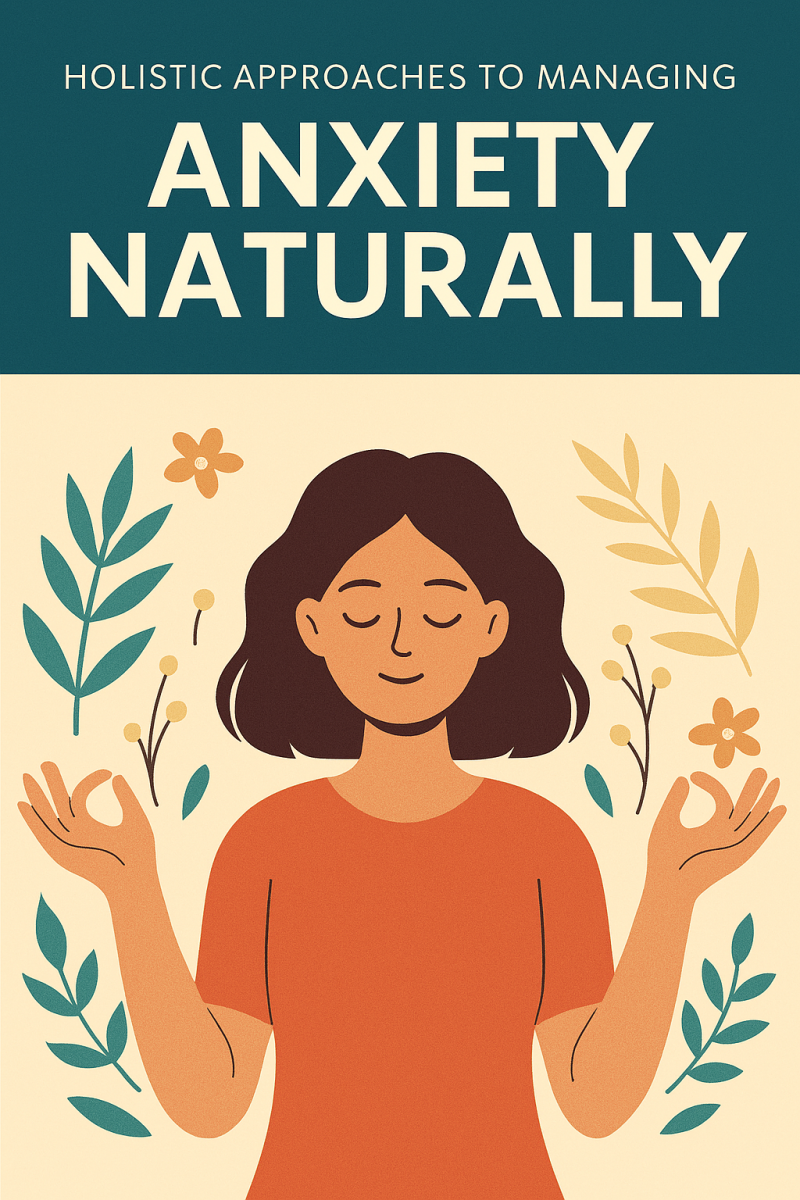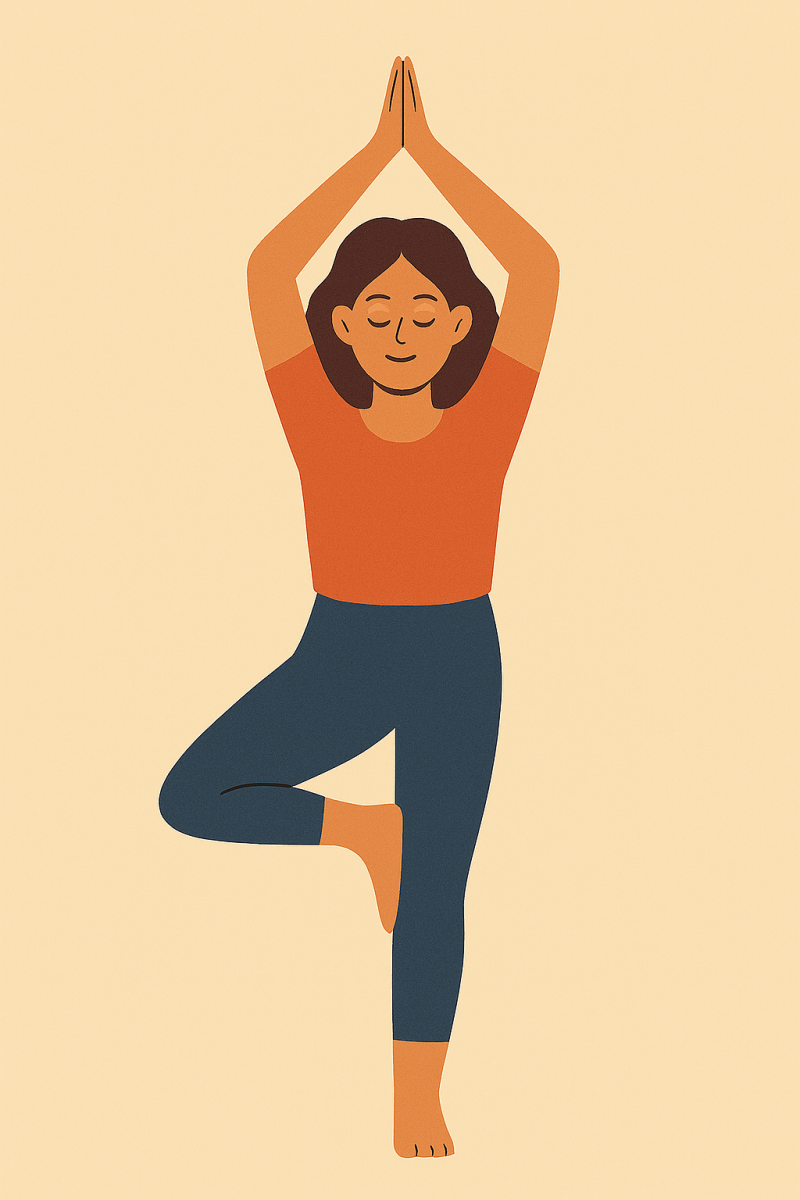
Anxiety is one of the most common mental health challenges of our time, yet so many of us are still searching for sustainable ways to manage it without relying solely on prescriptions or quick fixes. While medication and therapy absolutely have their place, many people are also turning to holistic practices—methods that focus on the whole person—to reduce anxiety and restore balance in their daily lives.
Holistic approaches work by looking at the interconnectedness of mind, body, and spirit. Instead of simply numbing symptoms, these practices aim to support long-term resilience, stress reduction, and overall well-being. Let’s dive into some of the most effective natural, research-backed strategies.
🌱 Nutrition for Calming the Mind
What we eat directly affects how we feel, and anxiety is no exception. Poor nutrition, blood sugar spikes, and excessive caffeine can all worsen anxiety symptoms.
Key Foods for Anxiety Management:
- Magnesium-rich foods (leafy greens, nuts, seeds) → support nervous system function.
- Omega-3 fatty acids (salmon, walnuts, flaxseeds) → reduce inflammation and support brain health.
- Probiotic-rich foods (yogurt, kefir, kimchi, sauerkraut) → improve gut health, which is deeply linked to mood regulation.
- Chamomile tea → shown in some studies to reduce mild to moderate anxiety.
Avoid in excess: refined sugar, alcohol, processed foods, and too much caffeine.
🧘 Movement and Breathwork
Exercise isn’t just about physical health—it’s one of the best natural “medicines” for anxiety. Moving the body helps release endorphins, reduces stress hormones like cortisol, and creates a sense of grounding.
Try this:
- Yoga or Tai Chi → combines gentle movement with mindfulness, excellent for reducing anxiety.
- Walking outdoors → exposure to nature lowers anxiety and boosts mood.
- Breathwork techniques like box breathing (inhale 4, hold 4, exhale 4, hold 4) → calm the nervous system in moments of panic.

🧠 Mindfulness and Meditation
Mindfulness helps us break the cycle of anxious thoughts by pulling us back into the present moment. Over time, meditation actually rewires the brain, strengthening areas linked to emotional regulation.
Simple practice: Sit quietly for 5 minutes. Focus on your breath. Each time your mind drifts (and it will), gently bring your attention back to your breath. No judgment. Just presence.
Apps like Headspace, Calm, or free YouTube meditations can be a helpful guide for beginners.
🌿 Herbal Remedies and Natural Supports
Herbs have been used for centuries in cultures around the world to calm the mind and soothe the body. While they’re not a replacement for professional care, many can support anxiety relief:
- Ashwagandha → an adaptogen that helps regulate the body’s stress response.
- Valerian root → often used to support sleep and relaxation.
- Passionflower → shown in some studies to reduce mild anxiety.
- Lavender oil → inhaling or diffusing lavender can ease nervous tension.
⚠️ Note: Always check with a healthcare provider before mixing herbs with medications.
🛌 The Power of Rest and Sleep
Anxiety and sleep are deeply connected: lack of rest fuels anxiety, and anxiety often makes it hard to sleep. Establishing a consistent sleep routine is essential.
Tips for better rest:
- Create a calming bedtime ritual (reading, herbal tea, soft music).
- Keep your sleep environment dark, cool, and quiet.
- Limit screen time at least an hour before bed.
🤝 Connection and Community
Holistic health recognizes that humans are wired for connection. Isolation feeds anxiety, while strong social bonds can buffer against it.
- Reach out to a trusted friend or family member.
- Join a community group, support circle, or even an online forum.
- Volunteering can also shift focus outward, fostering both purpose and connection.
✨ Final Thoughts
Anxiety can feel overwhelming, but it doesn’t have to control your life. By embracing a holistic approach—nourishing your body, moving with intention, practicing mindfulness, leaning on herbal supports, prioritizing rest, and staying connected—you can build a toolkit of natural strategies to calm your mind and strengthen your resilience.
For me, what’s powerful about holistic practices is their history and cultural roots. Long before modern medicine, communities across Asia, Africa, and the Middle East leaned on herbs, breath, rituals, and food to restore balance in both body and spirit. There’s wisdom in these traditions that we can still honor and integrate today.
Add comment
Comments
As always, your posts speak to me. I especially loved the part about herbs and nutrition—it reminded me of how, back home in Sri Lanka, amma always made us drink gotu kola tea or rubbed coconut oil into our scalp when we felt restless. It’s comforting to see those cultural practices honored here, not just the Westernized versions. You’re right, anxiety relief isn’t about quick fixes—it’s about connection, balance, and remembering where these traditions come from.
For anyone curious, here’s a simple way we make gotu kola tea in Sri Lanka:
• 1 handful of fresh gotu kola leaves (or a teaspoon dried)
• 1 cup hot water
• Optional: a small piece of ginger or a squeeze of lime for taste
Wash the leaves well, then steep them in hot water for 5–7 minutes. Strain, and sip slowly. It’s calming, supports focus, and has been used for generations to soothe the nervous.
Just a note as a nurse: moderation is important—too much can sometimes upset the stomach, and it’s best to check with your doctor if you’re pregnant, breastfeeding, or taking medication.
Muito obrigado por este artigo! Vou começar a aplicar algumas dessas técnicas para ajudar a reduzir minha ansiedade diariamente.
Thank you for this insightful post! In Finland, we’ve long embraced holistic approaches—herbal teas, sauna rituals, and connecting with nature are central to how many of us maintain mental and physical well-being.
At 55, my wife and I maintain our health with daily herbal infusions and gentle yoga. It’s become a peaceful routine that supports both our mental and physical well-being.
I really appreciated reading this, thank you for giving such a balanced and thoughtful approach to anxiety. I grew up in a small town here in the U.S., and my father was the town doctor. While he practiced conventional medicine, he also believed strongly in integrating holistic and herbal remedies whenever possible. He used to tell me that true healing comes when you treat the whole person, not just the symptom, and I carry that lesson with me to this day.
Over the years, I’ve adopted several practices that have helped not only with stress and anxiety, but also with lowering blood pressure and managing cholesterol naturally. A few things that my father taught me—and that I’ve seen work for myself and others—are:
• Garlic & Hawthorn Berries: Garlic is a powerhouse for keeping blood pressure in check, and hawthorn berries are excellent for strengthening the heart. My father used to make a simple hawthorn tea for his patients who wanted to support heart health without relying only on prescriptions.
• Daily Movement: It doesn’t have to be intense exercise. Even a brisk 20-minute walk, yoga, or gentle stretching is enough to release stress, lower cortisol levels, and over time, reduce blood pressure.
• Meditative Breathing: One of the simplest techniques he taught me was “4-7-8 breathing”—inhale for 4 counts, hold for 7, exhale for 8. It’s amazing how quickly it calms the nervous system.
• Oats & Flaxseed: These are excellent for lowering cholesterol. A bowl of oatmeal with ground flaxseed in the morning not only soothes the stomach but helps maintain healthy cholesterol levels.
• Herbal Teas: Chamomile, passionflower, and lemon balm are favorites for easing anxiety before bed. Hibiscus tea, in particular, is wonderful for reducing blood pressure—I still drink it several times a week.
I don’t dismiss modern medicine—it saves lives every day—but I do believe that we’ve lost touch with so many natural supports that can improve our overall health. Combining both approaches has given me balance, and I’m so glad to see more people open to it now.
Thank you again for this post—it reminded me of many conversations I had with my dad, and it gives me hope that more people will embrace a holistic path toward healing. 🌿
Will these tips also work during an anxiety attack, or are they more for everyday prevention?
That’s a great question, Jason. Some of these—like breathing exercises, mindfulness, and even lavender oil—can help in the middle of an anxiety attack by calming your nervous system in real time. Others, like nutrition, herbal supports, and sleep, are more about long-term prevention and resilience. It’s really about having a toolkit of both immediate and ongoing strategies.
Shouldnt we check with our pcp before beginning this?